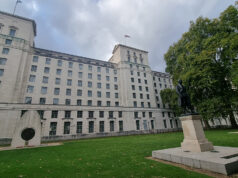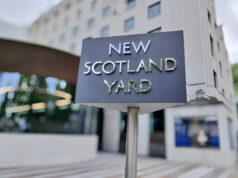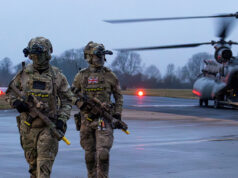The number of chefs serving in the British Army has seen a sharp decline over the past 15 years, dropping from 2,547 in 2010 to just 868 in 2024.
This significant reduction was disclosed by Luke Pollard, the Parliamentary Under-Secretary for Defence, in response to a written question from Derek Twigg MP.
This reduction in chef numbers parallels a broader decrease in overall Army personnel. In 2010, the British Army comprised approximately 114,000 regular full-time personnel. By 2024, this number had decreased to around 75,000.
The following table, provided by Pollard, outlines the number of chefs in post on 1 April of each year since 2010:
| Year | Total Chefs in Post |
|---|---|
| 2024 | 868 |
| 2023 | 920 |
| 2022 | 945 |
| 2021 | 973 |
| 2020 | 992 |
| 2019 | 1,061 |
| 2018 | 1,136 |
| 2017 | 1,186 |
| 2016 | 1,222 |
| 2015 | 1,281 |
| 2014 | 1,586 |
| 2013 | 1,969 |
| 2012 | 2,296 |
| 2011 | 2,556 |
| 2010 | 2,547 |
Over the years, there has been a consistent decline in numbers, with 1,061 chefs in 2019, 992 in 2020, and fewer than 900 currently in post.
Pollard declined to provide details on the Army’s workforce requirements for chefs, stating: “We do not routinely release the workforce requirement figures of Army regiments or specialist professions as doing so is likely to prejudice the capability, effectiveness or security of the Armed Forces.”













This leaves a bad taste in the mouth.
Can’t believe the chefs are for the chop.
Is this something to do with civilians taking over the messes and cookhouses on camps I left 96 after 24 years and it was starting then.
Possibly. Outsoucing such activities to the private sector makes sense on one level – on major bases etc. It would also allow service personnel to focus on other activities.
I thought the Army was at about 103,000 full time in 2010 before the defence review.
1. As a start figure, 2500 seems a high % out of a 114000 force? I’d never have guessed there were so many to start with.
2. Agree with Robert, thought the Army was around 104,000 by that date.
3. Assume each major unit, Battalion to Regiment, has it’s own complement of Chefs. There are no “Chef Regiments” ( though I recall in the Reserve there is still a Catering
Support Regiment at Grantham.
So does that decline go hand in hand with the decease in Battalion and Regiment overall numbers?
Less units, less people, less Chefs, seems natural to me.
4. Did regular Army chefs always do the catering at Garrison, Barracks, so when not deployed? As I’ve read many times of the drop in catering standards with privatisation of camp support services.
For a 73k army, 800 being a chef still seems a high % when you consider the hundreds of army roles.
5. Out of interest, the Army Catering School still exists, and is at Worthy Down, it’s now been merged into a tri service set up, like other training schools.
6. Having said all that, if the saying “An Army matches on its Stomach” remains true, how serious is this in reality?
Most units have some chefs attached, but I think they are assigned “by camp” rather than “by unit.” Though I could be wrong, my impression is that most scoff houses are a mix of civilian contractors and military staff, with the military staff being depoyable. The limitations on army chefs in the field is really the ability to sustain cooking facilities (if you have a FOB that’s got a cooking facility you now need to worry about fire hazards, where does the food get stored, refrigeration, pest control, where does the grey water go, where does the uneaten food get disposed off, etc. On ORP’s the only real worry is “can we provide enough dragonfuel” and “do we have a burnspit to dispose of the wrappers.”).
Honestly the drop in catering standards usually (usually) has little to do with army vs contractor chefs, but much more to do with the quality of ingredients and the portion control that the contractor is willing to spend on (and sometimes the state of the dining facility itself).
Thanks mate. Good insight.
Army Chefs are still assigned to units, not camps. PAYD is to blame here, outsourcing homebase catering to civilian contractors gave the MOD the excuse to heavily cut the numbers. As anyone who works in the LOC will tell you, this was a big mistake – good luck trawling for chefs for your exercise these days! Final point – don’t underestimate the (positive) impact of military catering support on the moral component of the fighting power – Napoleon was right . . .
Just going to point out that “Pay as you dine” does not mean bad food or even civilian contractors. It just means giving soldiers more control over their expenditure.
I firmly take the opposite view on this issue for two compelling reasons. First and foremost, I am good friends with two former Army Chefs who served from 1986 to 1997. Despite the typical ribbing about my friend’s Gulf War medal—he was stationed in Cyprus during Gulf War I, while I was testing the sand on Kuwaiti beaches most nights during Iraq’s occupation—we all agree on one crucial point: the decline of a once-great institution in the Catering Corps is unacceptable. In the mess halls and during my visits to other facilities, I have been served some of the finest dishes I’ve ever tasted, all crafted by Navy/RAF/Army Chefs. At CTCRM, they used to demonstrate impressive empathy towards recruits, often checking which miler they were on and ensuring their meal programs were meticulously targeted to meet the body’s nutritional needs during demanding training weeks. I regret not inquiring further, but my friend explains that the prevailing attitude was always, “We are soldiers first”.
Secondly, this post is about maintaining standards. I cannot comprehend why the forces choose to engage outside contractors. This decision strips the forces of a critical skill set we are renowned for and negatively impacts morale across all ranks. The events I’ve attended, from ship/Regimental gatherings to hosting dignitaries in our Mess, have consistently demonstrated exceptional quality—often surpassing what I’ve experienced at the Palace. When foreign officers join us for an event, they are genuinely impressed by the standards we uphold. If you want to witness an immaculate uniform, attend an event where a foreign officer is the guest; they ensure everything is perfect down to minute details because they expect high standards from their hosts.
Unfortunately, since Sod^all^exo took over, that level of care has vanished. Why would they bother to care when they advertise the manager’s job at CTCRM at a mere £22K PA, and that’s for working u so I able hours too! As with most things contracted out, it doesn’t work on more than one angle.
So you say you’re taking the opposite view, and then don’t actually disagree with me?
Me: You could have Pay as you Dine and still have the service kept in house, it wasn’t pay as you dine, it was the choice to switch to contractors that caused the deterioration of the food offer.
You: Yes but contractors make the food worse!
Like, my guy, you are agreeing with me.
Having suffered army “chefs” for a few decades? I question their need to exist at all. in the field, compo is king. On base? Nothing wrong with civvies making a fry. Memory of one brick where a cook was making up the numbers. I swear that was not DPM brown on his rear end.
Compo certainly is not king. The novelty of cooking your own food soon wears off. Can’t beat a mess tin of food cooked and served by Catering Corp in the field. Mug of NATO standard tea and hot soapy water to clean up. Happy days.
Maybe some of us served where the luxury of the field kitchen was just that eh?
I have. ORP’s are specifically meant to be a short term thing, to be broken up with food served fresh from a field kitchen, and for that to happen you need military chefs.
Maybe Basil Fawlty poisoned them all when in the Catering Corps. 😏
You just don’t need them.
Outsourced cookhouse to sodexo ess etc for substandard food when these magicians would cook the best food going. Where do you employ them now. You only need a couple per unit for occasional deployments rest will get trawled from other units.
Whilst with my regiment in Munster we had possibly the best food in the army can’t praise them enough. I was told a couple of weeks ago that the ACC used to run over 120 catering courses per year now it’s down to 6.
The whole “ Cold War peace dividend” from western leaders after the Cold War ended and from our leaders is criminal taking a holiday from history
“Every man a soldier,
Every woman a nurse”
“Let them eat cake”
“An army marches on its stomach”
The quotes are cool for this one
🫶✌️
There will always be a requirement for chefs for central feeding in operational areas that can’t be outsourced to some civvy company that charges the mod for the privilege so they can make a profit
It has to be said that the major reason for this ‘decline’ in numbers, is sub-contracting the catering to the private sector. This was another poorly conceived ‘wheeze’, dreamt up by someone who is either on the board of a catering company, or a complete moron, who frankly has little to no knowledge as to how a ‘group or collective’ integrate, bond, connect, make acquaintances and associate with fellow members of the Armed forces.
To answer a few “posters” comments, just how many Bde headquarters and “2nd line units have all the officers and men getting out their Operational Ration Packs and a Hexi burner plus mess tins to make their meals. Yes they are deployed in the “field”, but this is where Army chefs come into their own. Similarly in “fixed” operating bases overseas, one of the best things a soldier can look forward to is waking up, or finishing work and being ble to walk over to a “tented” cookhouse to have a great meal.
Whilst I spent quite a large part of my 22 yr career on exercise in the back of an armoured vehicle cooking tinned meals on either a gas cooker or in the BV, there was nothing more satisfying than eating a meal prepared by a professional chef.
The reduction in army chefs is another of those mad and stupid ideas dreamt up by muppets miles and miles away from the frontlines.
Loved eating from the slop tent on ex and when deployed, we had a great team of chefs in one of my former units, they made cakes in the field from the dry stores. Getting a mess tin of rations made to taste like real food was the highlight of a tour.
We where doing a low level Company shake out exercise next to a REME unit a while ago, they’d brought their field kitchen out with them for their exercise and very kindly invited us to have lunch with them when we came back to the hard standing between serials. (Not entirely sure what they got out of it but there was plenty of food, so maybe we just helped with the disposal). I think “Fresh Food Day” on a major OTX just about beat it out, but that’s a very hard standard to beat.
Can’t over-rate a field kitchen.
Anyone see a person above the rank of Lt cook their own food? Let alone the OC or CO. Now multiply that by about 50 for a Brigade HQ and more for a Division. So yea a cookhouse tent and chefs were totally needed back in the day!
It is the hardest course in the military! Nobody can pass it!
UKDJ. Any reason why you thought a picture of gunners is any way relevant to an article about chefs?
Shows a distinct lack of editorial effort, and makes you look very “tabloid”. I expect better.
Do you have an free to use pictures of RLC chefs?
Since my first RAF Service meal in 1966, up to my last trip to Shrivenham as a scum sucking civvy, I’ve had some great meals. Highlights like the St Athan Airmans Mess being struck from a Catering Inspection..too many cockroaches on the servery..and the Christmas Turkey portions served up on sheets of bog paper.
To a Sgt Chef asking how I would like my steak cooked at RAF Bicester
The first was an almost 100% Civilian mess, the second was all service
The SudPar..ex cooks were not motivated, except for the money, serving forces chef, and cooks in general were cooking for fellow service personnel
Like everything MOD has done, it’s been cost reduction, the food is no better than in prison, don’t ask how I know..
The bean counters haven’t improved anything since Rourkes Drift